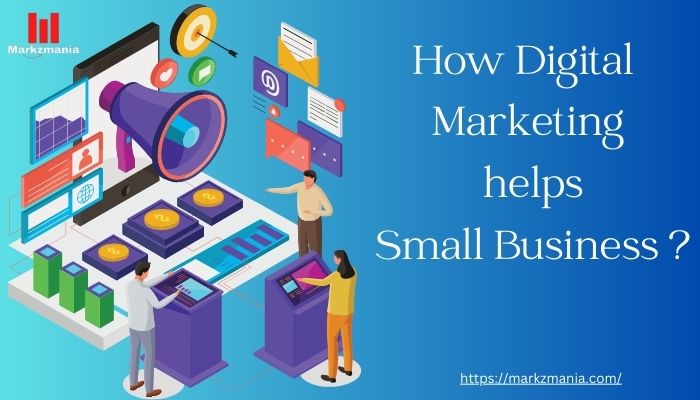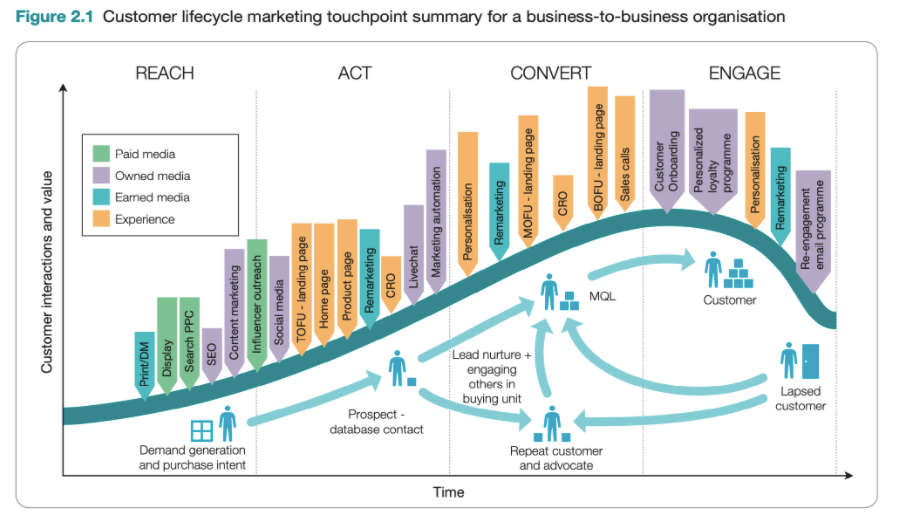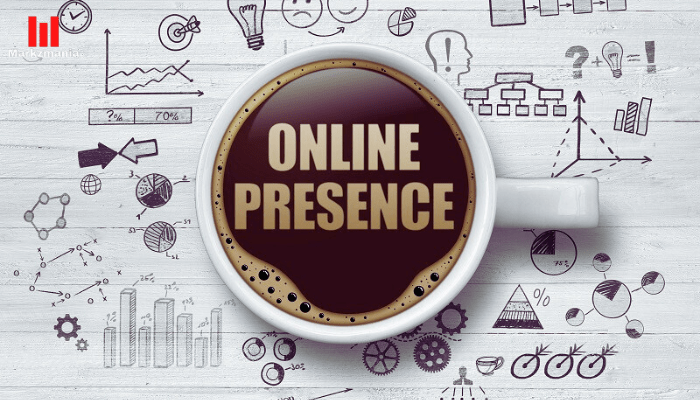Digital marketing helps small businesses by increasing online visibility,
Digital marketing has transformed the way businesses of all sizes reach and engage with their target audience. For small businesses, in particular, digital marketing offers a multitude of opportunities to level the playing field with larger competitors. In this comprehensive guide, we’ll explore how digital marketing helps small businesses succeed and grow with Markzmania Digital Marketing Agency.

I. Introduction to Digital Marketing for Small Businesses
Digital marketing encompasses a wide range of online strategies and tactics aimed at promoting products, services, or brands through Markzmania Digital Marketing Agency. These channels include websites, search engines, social media platforms, email, content marketing, online advertising, and more. Small businesses, with their limited resources and budgets, can benefit significantly from digital marketing helps small business for several reasons:
- Cost-Effectiveness: Traditional forms of advertising, such as TV or print ads, can be prohibitively expensive for small businesses. In contrast, digital marketing offers affordable options, enabling small businesses to reach a broader audience without breaking the bank.
- Targeted Marketing: Digital marketing allows businesses to pinpoint their ideal customers based on demographics, interests, behaviors, and more. This precise targeting ensures that marketing efforts are directed at those most likely to convert into customers.
- Online Presence: In today’s digital age, having a strong online presence is essential. A well-designed website, active social media profiles, and other online assets help small businesses establish credibility and connect with potential customers around the clock.
- Measurable Results: Digital marketing provides tools and metrics to track the performance of marketing campaigns. This data-driven approach allows small businesses to assess what’s working and adjust strategies accordingly, maximizing return on investment (ROI).
Now, let’s delve deeper into the various ways digital marketing can benefit small businesses:
II. Cost-Effective Marketing Strategies
digital marketing helps small business to often operate on tight budgets, making cost-effective marketing strategies a necessity. Digital marketing offers several budget-friendly options:
1. Search Engine Optimization (SEO)
SEO involves optimizing your website and online content to rank higher in search engine results pages (SERPs). By improving your organic search visibility, you can attract more organic (free) traffic to your website. Markzmania Digital Marketing Agency can benefit from SEO by:
- Increasing Visibility: Ranking higher in search results makes it easier for potential customers to find your business.
- Building Credibility: High-ranking websites are often perceived as more trustworthy.
- Long-Term Results: Unlike paid advertising, the effects of SEO can last for months or even years.
2. Content Marketing
Content marketing involves creating and sharing valuable, relevant, and consistent content to attract and engage a target audience. Small businesses can use content marketing to:
- Educate Customers: Provide information that helps customers solve problems or make informed decisions.
- Build Trust: Establish your business as an authority in your industry.
- Drive Traffic: High-quality content can attract visitors to your website and social media profiles.
3. Social Media Marketing
Social media platforms like Facebook, Instagram, Twitter, and LinkedIn offer cost-effective ways to connect with your audience. Small businesses can use social media marketing to:
- Engage Customers: Interact with your audience, answer questions, and foster relationships.
- Promote Products: Showcase your products or services and drive traffic to your website.
- Run Targeted Ads: Social media platforms allow for precise audience targeting, ensuring your ads reach the right people.
4. Email Marketing
Email marketing is an efficient way to nurture leads and retain customers. Small businesses can leverage email marketing to:
- Stay in Touch: Keep customers informed about promotions, updates, and news.
- Personalize Communication: Tailor email content based on customer preferences and behavior.
- Drive Sales: Encourage repeat purchases and upsell products or services.
5. Pay-Per-Click (PPC) Advertising
PPC advertising, with Markzmania Digital Marketing Agency often run through platforms like Google Ads and Bing Ads, allows businesses to pay only when users click on their ads. This cost-effective approach provides several advantages:
- Immediate Results: Ads can appear at the top of search results almost instantly.
- Budget Control: Small businesses can set daily or monthly budgets to control spending.
- Targeted Advertising: Ads can be highly targeted to specific keywords and demographics.

Targeted Marketing for Small Businesses
One of the most significant advantages of digital marketing helps small business is the ability to target specific demographics, interests, and behaviors. This precision ensures that marketing efforts are focused on individuals who are more likely to become customers. Here’s how small businesses can benefit from targeted marketing:
1. Audience Segmentation
digital marketing helps small business by giving platforms allow businesses to segment their audience based on various factors, including age, gender, location, interests, and online behavior. This segmentation enables small businesses to create personalized marketing campaigns that resonate with specific groups of people.
For example, a local bakery can use social media advertising to target residents in its vicinity, while an online clothing store can tailor ads to specific age groups or fashion preferences.
2. Remarketing
Remarketing, also known as retargeting, is a digital marketing helps small business to build strategy that targets users who have previously interacted with your website or brand. Small businesses can benefit from remarketing by:
- Reengaging Visitors: Remind users about products they viewed but didn’t purchase.
- Increasing Conversions: Encourage users who abandoned their shopping carts to complete their purchases.
- Building Brand Awareness: Stay top-of-mind with potential customers who have shown interest.
3. Customized Content
Targeted marketing allows small businesses to create customized content and offers for different segments of their audience. By tailoring content to individual preferences, businesses can improve engagement and conversion rates.
For instance, an e-commerce store can send personalized product recommendations to subscribers based on their past purchases, increasing the likelihood of repeat business.
4. Data-Driven Decision-Making
Digital marketing provides access to a wealth of data and analytics. Small businesses can use this data to gain insights into customer behavior, campaign performance, and ROI. By analyzing this information, businesses can make data-driven decisions to optimize their marketing strategies continually.
IV. Establishing and Expanding Online Presence

In today’s digital-centric world, an online presence is paramount for small businesses. Here’s how digital marketing helps small business for establishing and expanding that presence:
1. Professional Website
A well-designed, user-friendly website is the cornerstone of a small business’s online presence. Digital marketing can help in various ways:
- Search Engine Visibility: Optimizing your website for search engines (SEO) makes it easier for potential customers to find you online.
- Credibility: A professional website enhances your brand’s credibility and trustworthiness.
- Accessibility: Your website is accessible to customers 24/7, providing information and generating leads even outside of business hours.
2. Social Media Engagement
Active participation on social media platforms helps digital marketing helps small business engage with their audience and build brand awareness. Digital marketing through social media involves:
- Regular Posting: Sharing content, updates, and promotions to keep followers engaged.
- Interactions: Responding to comments, messages, and reviews to foster customer relationships.
- Ads and Promotions: Using paid advertising options on social media to expand reach.
3. Online Reviews and Reputation Management
Online reviews and ratings play a significant role in influencing consumer decisions. digital marketing helps small business to builds strategies can help small businesses manage their online reputation by:
- Encouraging Reviews: Soliciting reviews from satisfied customers.
- Addressing Negative Feedback: Responding professionally to negative reviews and working to resolve issues.
- Monitoring and Managing: Keeping track of online reviews and taking proactive steps to maintain a positive reputation.
4. Local SEO
For small businesses with physical locations or service areas, local SEO is critical. digital marketing helps small business appear in local search results when potential customers are searching for products or services nearby. Local SEO involves:
- Google My Business Optimization: Claiming and optimizing your Google My Business listing with accurate information, photos, and customer reviews.
- Local Citations: Ensuring that your business information (name, address, phone number) is consistent across online directories and platforms.
- Local Content: Creating content that is relevant to your local audience and includes location-specific keywords.
V. Measuring and Improving Results
digital marketing helps small business with the tools and metrics needed to measure the effectiveness of their marketing campaigns. This data-driven approach allows for continuous improvement and optimization. Here’s how digital marketing helps small business can make the most of digital marketing analytics:
1. Key Performance Indicators (KPIs)
Identifying and tracking KPIs is crucial for evaluating the success of digital marketing efforts. Common KPIs for small businesses include website traffic, conversion rate, click-through rate (CTR), customer acquisition cost (CAC), and customer lifetime value (CLV).
2. Analytics Tools

There are various analytics tools available, such as Google Analytics, that provide detailed insights into website traffic, user behavior, and conversion paths. Small businesses can use these tools to:
- Track Traffic Sources: Understand where website visitors come from (e.g., organic search, social media, paid ads).
- Monitor User Behavior: Analyze how users interact with your site and where they drop off.
- Evaluate Conversion Funnel: Identify areas where visitors are converting into customers and where they abandon the process.
3. A/B Testing
A/B testing involves creating two versions of a webpage, email, or ad with slight variations and then comparing their performance. digital marketing helps small business can use A/B testing to:
- Optimize Landing Pages: Determine which page design or content leads to higher conversions.
- Improve Email Campaigns: Test subject lines, visuals, and calls to action to increase email open and click-through rates.
- Refine Ad Creatives: Experiment with ad copy, imagery, and targeting options to improve ad performance.
4. Continuous Improvement
Digital marketing is not a one-time effort but an ongoing process of refinement. Digital marketing helps small business should regularly review their data, identify areas for improvement, and make strategic adjustments to optimize their marketing campaigns.
VI. Conclusion
In the digital age, digital marketing helps small business can harness the power of digital marketing to compete effectively with larger competitors. Through cost-effective strategies, targeted marketing, and the establishment of a strong online presence, small businesses can reach their target audience, engage with potential customers, and measure their results with precision.
By embracing digital marketing helps small businessand staying informed about the latest trends and technologies, small businesses can thrive in a dynamic and competitive marketplace. The ability to adapt, analyze data, and make informed decisions will continue to be essential for small business success in the digital era.
